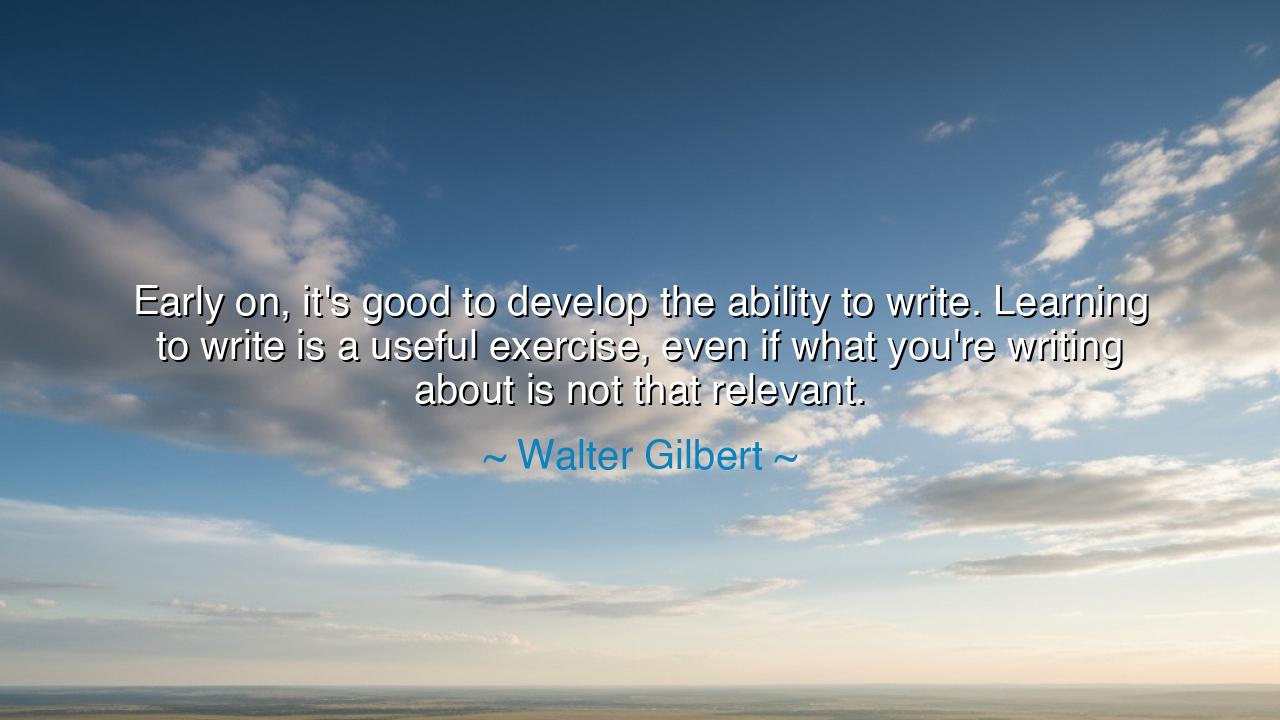
Early on, it's good to develop the ability to write. Learning to
Early on, it's good to develop the ability to write. Learning to write is a useful exercise, even if what you're writing about is not that relevant.






Hear the words of Walter Gilbert, Nobel laureate and seeker of truth, who declared: “Early on, it's good to develop the ability to write. Learning to write is a useful exercise, even if what you're writing about is not that relevant.” At first, his counsel seems simple, but within it lies a profound teaching about discipline, clarity, and the shaping of the mind. For the act of writing is not merely the recording of thought, but the training of thought itself, and even the humblest exercise in words can strengthen the soul for greater labors.
He speaks of the need to develop the ability to write early on, for writing is a craft that does not spring forth in perfection but grows through practice. Just as the warrior sharpens his blade upon stones of little worth before facing the enemy, so too does the student sharpen his mind upon subjects of lesser weight. In such practice lies preparation, for when the hour of importance arrives, the hand and mind will already be steady. Thus Gilbert teaches us that what may seem trivial in youth is often the groundwork for greatness in maturity.
He reminds us that writing is useful even if the subject is not relevant. For the power of writing does not lie only in the matter written, but in the exercise of expressing thought with precision and force. The ancients knew this well: the philosophers of Greece wrote dialogues of imagined conversations, sometimes about trivial things, not because the subjects mattered, but because the act of arranging words trained their minds for truth. The Roman orators rehearsed speeches on fictional cases, for by practicing the art of persuasion on the unimportant, they became mighty in matters of state.
Consider the story of Abraham Lincoln. In his youth, he wrote essays and debates on topics that mattered little beyond his village—mock speeches, arguments over simple laws. Yet through these exercises, he taught himself clarity, logic, and eloquence. Later, when the destiny of a nation fell upon his shoulders, he drew upon this practice. The words of the Gettysburg Address were not born in that moment alone, but from years of shaping his mind through writing, even on matters once thought irrelevant. Gilbert’s truth shines in Lincoln’s life: the exercise itself was the preparation.
The emotional essence of Gilbert’s words is humility before the process of learning. He urges us not to scorn small tasks, nor to despise exercises that seem disconnected from our passions. For in every act of writing, whether on lofty matters or simple ones, the mind is being forged. Like a blacksmith who hammers metal endlessly before shaping a sword, the writer hammers thoughts into clarity, sentence by sentence, draft by draft, until strength is born.
The lesson, O listener, is this: write, and do not wait for the perfect subject or the grand idea. Write even on the ordinary, the irrelevant, the fleeting. For each word is training, each page is preparation, each effort is the laying of stones upon the road of mastery. When the hour comes to speak with power, to argue with reason, to inspire with truth, you will be ready, for you will have trained your mind to serve your spirit.
What then shall you do? First, set aside time each day to write, even if the subject seems unimportant. Second, see writing not as a task to impress others, but as a discipline to sharpen yourself. Third, preserve what you write, for even in old drafts and forgotten essays lie the seeds of growth. And when you doubt the worth of your practice, remember that the act itself is the treasure, shaping you for future labors.
And remember always: as Walter Gilbert declared, the ability to write must be developed early, and every exercise is useful. Do not despise humble beginnings, for they are the foundation of eloquence, persuasion, and wisdom. Train your hand, sharpen your mind, and you shall one day wield words as weapons of truth, instruments of peace, and lights to guide generations yet to come.






AAdministratorAdministrator
Welcome, honored guests. Please leave a comment, we will respond soon